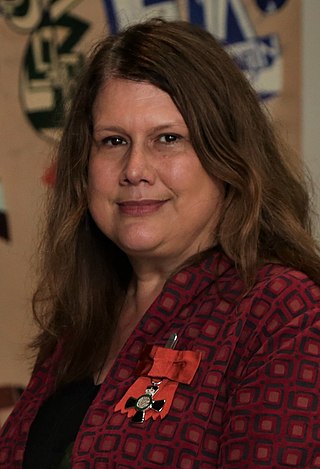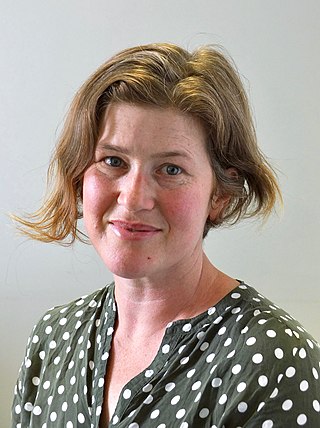Related Research Articles

Frank Sargeson was a New Zealand short story writer and novelist. Born in Hamilton, Sargeson had a middle-class and puritanical upbringing, and initially worked as a lawyer. After travelling to the United Kingdom for two years and working as a clerk on his return, he was convicted of indecent assault for a homosexual encounter and moved to live on his uncle's farm for a period. Having already written and published some short stories in the late 1920s, he began to focus on his writing and moved into his parents' holiday cottage where he would live for the rest of his life.

Michael King was a New Zealand historian, author, and biographer. He wrote or edited over 30 books on New Zealand topics, including the best-selling Penguin History of New Zealand, which was the most popular New Zealand book of 2004.
The Ockham New Zealand Book Awards are literary awards presented annually in New Zealand. The awards began in 1996 as the merger of two literary awards events: the New Zealand Book Awards, which ran from 1976 to 1995, and the Goodman Fielder Wattie Book Awards, which ran from 1968 to 1995.

William Manhire is a New Zealand poet, short story writer, emeritus professor, and New Zealand's inaugural Poet Laureate (1997–1998). He founded New Zealand's first creative writing course at Victoria University of Wellington in 1975, founded the International Institute of Modern Letters in 2001, and has been a strong promoter of New Zealand literature and poetry throughout his career. Many of New Zealand's leading writers graduated from his courses at Victoria. He has received many notable awards including a Prime Minister's Award for Literary Achievement in 2007 and an Arts Foundation Icon Award in 2018.
Charlotte Grimshaw is a New Zealand novelist, short-story writer, columnist and former lawyer. She has written both fiction and non-fiction, often drawing on her legal experience. Her short stories and longer works often have interlinked themes and characters, and feature psychological and family dramas.

Paula Jane Kiri Morris is a New Zealand novelist, short-story writer editor and literary academic. She is an associate professor at the University of Auckland and founder of the Academy of New Zealand Literature.

Vivienne Christiana Gracia Plumb is New Zealand poet, playwright, fiction writer, and editor.
Elspeth Somerville Sandys is a New Zealand author and script writer.
Anna Taylor is an author from New Zealand.

Diane Edith Brown is a novelist and poet from New Zealand.
Debra Daley is a New Zealand author.

Sarah Laing is a New Zealand author, graphic novelist and graphic designer.
Sue Reidy is a New Zealand author and designer.
Tina Shaw is a New Zealand author.

Brigid Lowry is a New Zealand author.

Tina Makereti is a New Zealand novelist, essayist, and short story writer, editor and creative writing teacher. Her work has been widely published and she has been the recipient of writing residencies in New Zealand and overseas. Her book Once Upon a Time in Aotearoa won the inaugural fiction prize at the Ngā Kupu Ora Māori Book Awards in 2011, and Where the Rēkohu Bone Sings won the Ngā Kupu Ora Aotearoa Māori Book Award for Fiction in 2014. She lives on the Kāpiti Coast, New Zealand.

Catherine Robertson is a New Zealand novelist, reviewer, broadcaster and bookshop owner.

Diana Wichtel is a New Zealand writer and critic. Her mother, Patricia, was a New Zealander; her father, Benjamin Wichtel, a Polish Jew who escaped from the Nazi train taking his family to the Treblinka extermination camp in World War II. When she was 13 her mother brought her to New Zealand to live, along with her two siblings. Although he was expected to follow, she never saw her father again. The mystery of her father's life took years to unravel, and is recounted in Wichtel's award-winning book Driving toTreblinka. The book has been called "a masterpiece" by New Zealand writer Steve Braunias. New Zealand columnist Margo White wrote: "This is a story that reminds readers of the atrocities that ordinary people did to each other, the effect on those who survived, and the reverberations felt through following generations."
Michalia Arathimos is a Greek–New Zealand writer. She has held several writers' residencies in New Zealand, and received several awards for her short stories. Her debut novel, Aukati, was published in 2017.
References
- 1 2 3 "Sue Orr". New Zealand Book Council. Retrieved 25 November 2017.
- 1 2 3 "Sue Orr: 'It took so long for women to stop being classified as criminals'". Stuff. 11 June 2021. Retrieved 20 July 2021.
- ↑ "Sue Orr". Penguin Books New Zealand. Retrieved 25 November 2017.
- ↑ Orr, Sue (2021). Loop tracks. Wellington: Victoria University Press. pp. 331–332. ISBN 978-1-77656-425-5. OCLC 1246680543.
- 1 2 Richardson, Paddy (17 June 2021). "Book of the Week: Her body, her choice". Newsroom. Retrieved 20 July 2021.
- ↑ Farrell, Fiona, ed. (2007). The Best New Zealand Fiction Volume 4 . Vintage. ISBN 9781869418779.
- ↑ Sonzogni, Marco S (2010). Lost in Translation: New Zealand Short Stories. Random House. ISBN 9781869791438.
- ↑ Morris, Paula, ed. (2009). The Penguin Book of Contemporary New Zealand Short Stories. Penguin Books. ISBN 9780143006817.
- ↑ "Sue Orr — Etiquette for a Dinner Party - Sport 25". victoria.ac.nz. Winter 2007. Retrieved 25 November 2017.
- ↑ "Turbine 2006". nzetc.victoria.ac.nz. 2006. Retrieved 25 November 2017.
- ↑ Irvine, Lindesay (6 May 2008). "Self-published author takes competition to bestseller rivals". The Guardian. ISSN 0261-3077 . Retrieved 25 November 2017.
- ↑ "NZSA Lilian Ida Smith Award". New Zealand Society of Authors & Writers Association. Retrieved 25 November 2017.
- ↑ "100 best books of 2008". The Listener. 13 December 2008. Retrieved 25 November 2017.
- ↑ "Past Winners by Author". New Zealand Book Awards Trust. Retrieved 25 November 2017.
- ↑ "Grimshaw Sargeson Fellowship". Grimshaw Sargeson. Retrieved 25 November 2017.